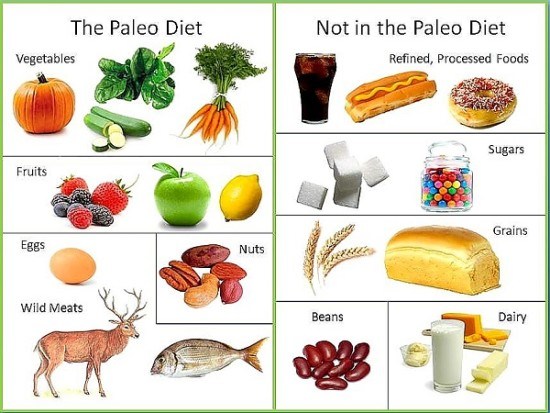Foods to Avoid on the Paleo/Primal Diet
By Living Paleo
Grains
As far as research can tell, the paleo hunter-gatherer consumed a diet rich in raw foods including meat, fish, fruits, vegetables and plants, and avoided foods which involved cooking in order to be edible; this included grains. When it was discovered around 100,000 years ago that cooking grains made them edible, they were quickly seen as a fantastic food source; not only could they be stored for longer periods of time (especially good for the winter periods), but they could be easily transported and were also calorie dense.
As time progressed, grains became rather popular, the farming of grains increased and new technologies were developed which increased the speed of production. But if there is one thing that has stayed the same during this period it’s our bodies, and our body’s ability to digest and assimilate this food source that is doesn’t recognise.
It has been a chaotic period for the human body trying to adapt to grains and other foods recently introduced through modern farming and processing technologies, but it hasn’t stopped the fact that more often than not grains are thought of as a healthy nutritious food source by most people, including physicians and nutritionists.
But grains are not the health promoting food so often advertised on TV and in popular health literature. Grains contain anti-nutrients which interact with our bodies function, producing adverse toxic effects inhibiting nutrient absorption and attacking enzymes needed for digestion. Grains also contain lectin and gluten; both linked to inflammatory problems and digestive diseases such as leaky gut.
The Glycemic Index of grains is also much higher to that of un-processed fruits and vegetables. A consistent rise in blood glucose levels leads to many health concerns, including diabetes, weight gain and cardiovascular diseases. Types of grains to avoid on the paleo diet include wheat and all processed foods made with wheat or wheat flour, rye and all processed foods made with rye, barley, rice, oats and corn.
Dairy
The reason dairy is not part of the paleo diet is because people did not eat dairy products before animals were domesticated. In my opinion, fresh dairy products from healthy animals (cow, goat or sheep) can be a beneficial addition to one’s diet. But the problem with the majority of dairy products lining up supermarket shelves comes down to two factors; the over-all health of the animal and the processing factors.
The environment and living conditions that commercial cows are placed under is not one that promotes good health. They are kept in a confined individual cell on cement floors in an over-crowded building, forced to produce milk ten months of the year. The cows are fed a diet consisting of grains, corn and soy and are more often than not pumped full of antibiotics and growth hormones. An un-healthy cow cannot produce healthy milk, and considering the life span of commercial cows is 42 months (compared to 12-15 years of a pasture cow), the milk is definitely anything but healthy.
Most dairy items we are able to purchase easily at supermarkets are heavily processed. The pasteurisation of milk significantly denatures the milk proteins and kills beneficial enzymes and bacteria. This same process is associated with yogurt; but to make things worse yogurt will also contain high traces of added sugar.
Legumes
Legumes have a similar story to grains; they weren’t consumed by the paleo hunter-gatherer because they needed to be cooked in order to be edible. Legumes also have similar traits to grains in their make-up; they contain phytates which inhibit nutrient absorption and cause inflammation. They also contain lectins and play with healthy hormonal functions.
Types of legumes to avoid on the paleo diet include lentils, all beans (such as kidney beans, pinto beans and broad beans), peanuts (peanuts are a legume not a nut), soy beans and chickpeas.
Sugars
It is fairly easy to see how sweets weren’t part of the hunter-gatherer diet; most candies and desserts are the result of modern technologies and heavy processing combining sugars and chemical flavors together.
For many thousands of years the paleo hunter-gatherer survived without consuming any traces of sugars apart from those found naturally in fruit such as berries. Refined sugars are only a recent introduction to society but its consumption is rapidly increasing every year; in 1900 the average person consumed 10pounds of sugar a year, in 1985 the average person consumed 124pounds a year, by the year 2000 the average yearly consumption of sugar was 160pounds per person.
The list of negative health effects sugar plays on the body is endless, not only is sugar nutrient deficient, but it also acts as an anti-nutrient inhibiting and draining nutrients from the body. Sugar is the leading cause of diabetes, weight gain, tooth decay, cardiovascular disease, osteoporosis and immune dysfunction.
With the addition of advanced food technologies, calorie-free sugars such as Aspartame, Equal and Splenda were created.
These artificial sugars aren’t the solution to the negative health effects of refined sugars because they play their own role in harming the body. Artificial sugars are made up of table sugar and modified with chemicals such as chlorine and phosgene gas, they act as an excitotoxin in the body which leads to the destruction of cells.
Trans-Fats
The only type of fats healthy for the body is essential fatty acids; essential because the body needs them in order to stay healthy. These fats can be found in meat, nuts, seeds and some vegetables.
The problem again when it comes to un-healthy fats comes down to modern food technologies; when oil is heated above 200 degrees Celsius the shape of the fatty acid molecules change, turning it into a toxic fat called trans-fat.
Some fats can turn rancid and cause free-radical damage in the body if applied to high temperatures, an article I wrote. titled Best Oils to Cook With will give you an idea of some oils to avoid placing under high temperate when cooking.
Our bodies use fat in many ways, but one of the more essential uses of fats in the body is to create cell membranes. Consuming the wrong types of fats (i.e., trans-fats) will cause the membranes to be un-healthy and ultimately mal-function and die.
Types of oils to avoid on the paleo diet include supermarket oils such as canola oil, vegetable oil, safflower oil and sunflower oil.

